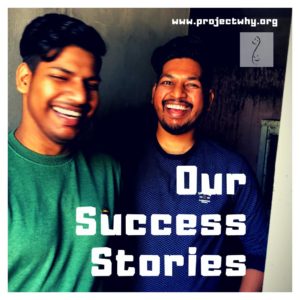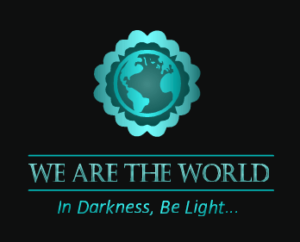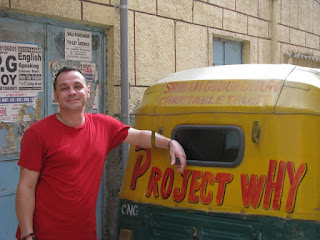
by Anuradha Bakshi | Jul 29, 2011 | Uncategorized
 Over the past years we have had many volunteers from the world over. Each has been special in his/her own way and left precious memories. Some however have done more! They simply walk into our hearts. One such soul is Jon.
Over the past years we have had many volunteers from the world over. Each has been special in his/her own way and left precious memories. Some however have done more! They simply walk into our hearts. One such soul is Jon.
He landed in our lives in late March and it was as if we had known him all our lives. His endearing ways won us over in no time. True he did have a raw first week courtesy some unavoidable circumstances, but those blew away once he moved to my house and for the days to come, nothing was the same as everything was touched by the magic of Jon West or should I say Best!
In his introductory mail Jon had stated he would like to stay for at least 1 month although I am flexible on dates and length of stay. The month turned into almost six. Jon did not take long to chose his place at pwhy. He decided to work with the special children and it was mutual love at first sight. Jon Bhaiya was adopted by one and all in no time. It was as if an old friend had returned home.
For the past 5 months Jon has been intrinsic part of the pwhy special class: be it the morning exercises, the classroom activities, the dancing sessions or simply the giggling ones. On the rare days he has been away, often nursing a bout of Delhi belly, the children never failed to ask why their Bhaiya had not turned up. I dread to even think about what will happen when he leaves next week.
There is also another side of Jon Bhaiya, one I have had the privilege to discover over time and that is his humane and sensitive nature. We have shared many special moments be it on our daily auto rickshaw ride to pwhy in the mornings or over a cup of tea in the evenings. I often found myself sharing my worries and angst or simply life thoughts. He not only gave a patient hearing to the ramblings of an old biddy but often helped me resolve my apprehensions and find my way.
Project why has been and is a very lonely journey. Loneliness is oft the price you have to pay to be on the top. You need put up a brave face, have a ready smile at almost all times, and find the required answer each time a question comes your way. And though you manage a mean show day after day, you too need to sometimes hop off the spinning wheel and recharge your used and overused batteries. That is when people like Jon are God sent!
We will all miss Jon West, I more than others!
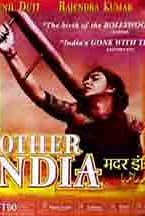
by Anuradha Bakshi | Jul 25, 2011 | Uncategorized
 I am sure many of you remember the epic film of the late fifties aptly named Mother India and the stunning poster that depicted the leading lady ploughing her land. The film was a symbol of the newly independent India and of the brave and righteous Indian woman. We have all seen the film and been touched by its story but it belonged to a distant past or so we thought. Yet 55 years later in a village in Vidharbha a farmer is tilling his land using his sons instead of bullocks. The news was aired a couple of days ago and I for one found it difficult to watch the images and had to turn my eyes away. I was filled with horror, extreme sadness and profound shame. This could not be happening and yet it was. And this was not all. Even after the story was highlighted by a local newspaper there was no relief as their appeal for a pair of bullocks was turned as they were considered to be above the poverty line and hence not eligible for the said scheme. All they got was free power to operate the well they had dug with their own hands. The family was considered above the poverty line because they owned 8 acres of land. Never mind if they had scant more! And theirs is not the only case.
I am sure many of you remember the epic film of the late fifties aptly named Mother India and the stunning poster that depicted the leading lady ploughing her land. The film was a symbol of the newly independent India and of the brave and righteous Indian woman. We have all seen the film and been touched by its story but it belonged to a distant past or so we thought. Yet 55 years later in a village in Vidharbha a farmer is tilling his land using his sons instead of bullocks. The news was aired a couple of days ago and I for one found it difficult to watch the images and had to turn my eyes away. I was filled with horror, extreme sadness and profound shame. This could not be happening and yet it was. And this was not all. Even after the story was highlighted by a local newspaper there was no relief as their appeal for a pair of bullocks was turned as they were considered to be above the poverty line and hence not eligible for the said scheme. All they got was free power to operate the well they had dug with their own hands. The family was considered above the poverty line because they owned 8 acres of land. Never mind if they had scant more! And theirs is not the only case.
What does one say! I am speechless just as I was when I read the Planning Commission’s aberrational definition of the poor as one who spent less than 15Rs a day. And that is not the only scary statistic. What about the one that states that a child does of malnutrition every 8.7 minutes or the one recently published in a leading magazine that states makes known that 46% of the malnourished children of the world live in India. This article pertains to the Food Security Bill that is sadly being watered down by the Government. Why am I not surprised. Such bills are made not to help anyone but to line more pockets. Children die while grain rots and bureaucrat and politician quibble over the definition of the word poor. That is the sad reality in 21st century India.
And what is sadder is that we all watch helpless and even unmoved. We still waste food, even throw food and when solicited for help by some humanitarian organisation are quick to retort that all organisations are dubious and suspicious. And the saddest part is that it is not only the uber rich who are profligate . The new poor, those who have arrived and now live in urban slums, emulate us unabashedly. For me it has been a losing battle over a decade to try and explain that food should not be wasted. In villages one can still give it to animals, in cities it is simply thrown in the garbage or even on the street. The most blatant example being the aftermath of religious feeding frenzies and wasteful weddings. And still we the so called educated and informed remain dry eyed. We do read about children dying, food rotting, people being used as bullocks; we see food being wasted, children begging at every street corner, beggars rummaging the garbage heap from a scrap of food but are too jaded to make connections and let alone take action. So why should our politicians. Are they not a reflection of who we are?
I just finished reading Indian Summer by Alex Von Tunzelmann, a book that retraces the last days of the British Raj and the advent of our Independence. What caught my attention was the humane nature of erstwhile leaders who could not bear to see any suffering and who felt compelled to reach out and act. Where have all such leaders gone? Today everyone seems inured to misery, suffering and more.
And that everyone includes me. Is it sufficient to feel horror, sadness, shame and write a blog from the comfort of my home?
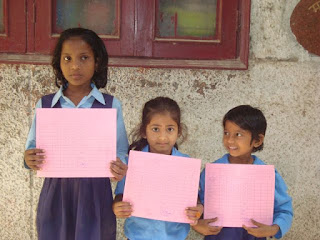
by Anuradha Bakshi | Jul 21, 2011 | Uncategorized
 I stumbled upon this picture while sorting the thousands of photos on my computer. I do not know how I had missed this snapshot! It was taken a few weeks ago when school results were announced. The three little topped their respective classes and had brought their report cards to show it to their teachers. The picture was shot just outside our Govindpuri primary centre.
I stumbled upon this picture while sorting the thousands of photos on my computer. I do not know how I had missed this snapshot! It was taken a few weeks ago when school results were announced. The three little topped their respective classes and had brought their report cards to show it to their teachers. The picture was shot just outside our Govindpuri primary centre.
The little girls were very proud of the attention they were getting. I think that till then no one had lauded their effort. That is too often the plight of children born on the wrong side of the fence. The stars that adorned their report cards are never praised by their parents who often are too busy to take a moment to give their children the much needed pat on their back.
We did and the girls were thrilled. On August 15th they will all receive a little shield with the words best student inscribed on it.
Looking at the pictures set my mind thinking. What does the future hold for these bright little girls. Going by past experience not much. They all come from extremely deprived homes and are often one of many siblings. Being of the wrong gender the probability of their being pulled out of school looms large: an early marriage, an ailing grandparent that needs to be tended to in the village or simply the whim of a drunken father who decides suddenly that his daughter has had enough education. The future of these little girls, is very fragile, very fragile.
I remember a quote sent to me long ago that said: I do not know beneath what sky; Nor on what seas shall be thy fate; I only know it shall be high, I only know it shall be great. In the case of my three little one would have to quietly replace the last two knows with wish!
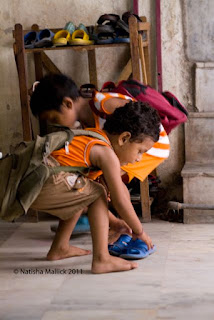
by Anuradha Bakshi | Jul 16, 2011 | Uncategorized
 Poor Economics is a book I would have never read but for a review in a magazine that piqued my curiosity. The review quoted the following words: What is striking is that even people who are that poor are just like the rest of us in almost every way. We have the same desires and weaknesses; the poor are no less rational than everyone else — quite the contrary. Precisely because they have so little, we often find them putting careful thought into their choices. They must be sophisticated economists just to survive. Yet our lives are as different as liquor and liquorice.
Poor Economics is a book I would have never read but for a review in a magazine that piqued my curiosity. The review quoted the following words: What is striking is that even people who are that poor are just like the rest of us in almost every way. We have the same desires and weaknesses; the poor are no less rational than everyone else — quite the contrary. Precisely because they have so little, we often find them putting careful thought into their choices. They must be sophisticated economists just to survive. Yet our lives are as different as liquor and liquorice.
These words were enough for me to want to get a copy and dive into it. It was a strange experience. A sort of deja vu, deja vecu. The book touches upon many of the fields we at pwhy are familiar with: education, health, saving, governance etc. I could almost put a face and a name to every story I read. It was eerie and somewhat comforting. What often seemed to be absurd suddenly became comprehensible. The umpteen frustrations were put into perspective and made some sense. It seemed that what I had often thought as singular instances were present across the spectrum of what you could call the poor worldwide. They all seemed to be talking the same language.
The book is replete of case studies that echo the ones we have experienced over the years. It also raises questions we have asked ourselves over and over again. Be it the state of State run schools, the poor quality of health services available to the poor, the inability of the poor to save, the presence of swanky TV in homes that have scant resources for essentials and so on. I found myself reading the book as you would a whodunit hoping to find not the name of the murderer but answers to all the perplexing whys!
Alas there are no ready made answers but a set of key lessons tucked away in the last chapter that could improve things if applied. The first lesson is that the poor lack critical pieces of information and believe what is not true and when their beliefs turn out to be incorrect they make wrong decisions. This so true and one of the biggest stumbling blocks we have come across in our journey. And often a simple piece of information can make all the difference. However to be effective the information needs to come from a credible source and in a simple way. This lack of information pans a wide spectrum. It could be about education, health and so on. I remember how local goons invaded our workshop on AIDS prevention as for them talking of about AIDS was dirty, a misconception that is sadly very prevalent.
Second the poor bear responsibility for too many aspects of their lives. This statement was an eye opener for me, something I had never thought of. And yet it is so true. The richer we are the less decisions we have to make. Many of our problems are taken care of: job security retirement benefits, access to good quality water, food, health etc. For the poor life is much more demanding as they have none of these. The authors suggest that their lives could be bettered if they were made to do the right thing easily: simple saving accounts, fortified salt, access to chlorine next to drinking water sources. Small remedies that could have lasting effect.
Third some markets are missing for the poor like insurance, easy loans, savings account etc. These according to the authors should be made available to them in innovative ways. This of course is beyond our realm of work but we all know how well micro finance has worked in some places. At the very beginning of our work we did try to launch a small loan programme but unfortunately it did not work as planned and had to be shelved.
Fourth poor countries are not doomed to failure. In many cases the problem is that programmes destined for them land in wrong hands or go the wrong way. This according to the book is due to the three Is: ignorance, ideology, inertia. Often absurd rules once in place keep on going because of inertial. The authors give the interesting example of village education committees which are meant to include parents of the best and worst student. Who decides that as there are no tests until the 8th grade. The good news is that much can be done in improving existing programmes. I have always held that if we could get the present social programmes to run at 50%, India would be a different country.
It is hard to say whether the conclusions of this treatise are optimistic or pessimistic. What the book shows is that the plight of the poor worldwide is worrying and needs to be addressed. There are solutions but they require a lot of effort and goodwill on the part of the very people who have hijacked them to feed their own greed. But what is also apparent is that the efforts of people like us, however small are still needed.
Finally expectations about what people are unable to do end up into turning in self fulfilling prophecies. Children give up on school when teachers signal to them that they are not smart enough to master the curriculum. Changing expectations is not easy, but it is not impossible.
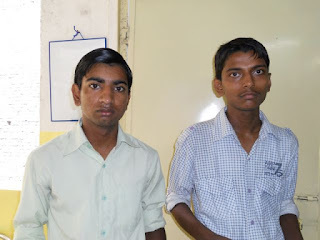
by Anuradha Bakshi | Jul 15, 2011 | Uncategorized
 This morning we handed out two drafts to Vivek and Shambhu for their respective courses. As you may recall we had launched an appeal a few days back to help these two bright lad realise their dreams. Many responded and we have managed to reach the half way mark. However as there was a deadline we decided to advance the missing sum and ensure that the boys are enrolled in their courses. The main reason being that they unlike many of their peers listened to our advice and opted for professional options rather than go for an almost useless degree from an evening college or a correspondence course. Once they have completed their course they will have have no problem getting started. Medical laboratory assistants are in great demand and a quick perusal of an employment website shows the starting salary to be 12 000 rs a month for those without experience. And a good electrician is worth his weight in gold and much sought, I just paid 800 rs for a couple of hours work to mine yesterday! So Shambhu and Vivek are definitely on the right track.
This morning we handed out two drafts to Vivek and Shambhu for their respective courses. As you may recall we had launched an appeal a few days back to help these two bright lad realise their dreams. Many responded and we have managed to reach the half way mark. However as there was a deadline we decided to advance the missing sum and ensure that the boys are enrolled in their courses. The main reason being that they unlike many of their peers listened to our advice and opted for professional options rather than go for an almost useless degree from an evening college or a correspondence course. Once they have completed their course they will have have no problem getting started. Medical laboratory assistants are in great demand and a quick perusal of an employment website shows the starting salary to be 12 000 rs a month for those without experience. And a good electrician is worth his weight in gold and much sought, I just paid 800 rs for a couple of hours work to mine yesterday! So Shambhu and Vivek are definitely on the right track.
A friend suggested that we put a rider on our support. She proposed we tell the two to boys that they need promise that when they are settled and earning they sponsor the education of a child each. It could be by paying their fees, or books or uniforms or simply by helping them with their studies. I kicked myself for not having thought of this as I remember being very touched by the Catherine Ryan Hyde’s book Pay it Forward. The book is about doing a favor for another person ~ without any expectation of being paid back. Indeed one would request that the recipient of that favor do the same for someone else ~ ideally, for three other people. What is special about this book is that a simple work of fiction evolved into a vibrant foundation. I remember wondering whether we too could adopt this precept. Now was the time.
So when we handed the cheques to Shambhu and Vivek we asked them to promise that they too would one day help educate a child. They were a bit perplexed at first but then slowly realised what we were saying and smiled broadly nodding their heads. I hope they remember their silent promise.
It was a great moment for all of us at pwhy as we felt we had reached somewhere. Shambhu was one of our very first students as he joined when he was in class II and we had just opened our doors. What a journey it had been. Maybe we did deserve a small pat on our backs!

 Over the past years we have had many volunteers from the world over. Each has been special in his/her own way and left precious memories. Some however have done more! They simply walk into our hearts. One such soul is Jon.
Over the past years we have had many volunteers from the world over. Each has been special in his/her own way and left precious memories. Some however have done more! They simply walk into our hearts. One such soul is Jon.








